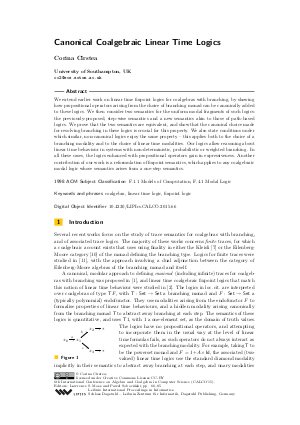Canonical Coalgebraic Linear Time Logics
Author Corina Cirstea
-
Part of:
Volume:
6th Conference on Algebra and Coalgebra in Computer Science (CALCO 2015)
Part of: Series: Leibniz International Proceedings in Informatics (LIPIcs)
Part of: Conference: Conference on Algebra and Coalgebra in Computer Science (CALCO) - License:
 Creative Commons Attribution 3.0 Unported license
Creative Commons Attribution 3.0 Unported license
- Publication Date: 2015-10-28
File

PDF
LIPIcs.CALCO.2015.66.pdf
- Filesize: 0.55 MB
- 20 pages
Document Identifiers
Subject Classification
Keywords
- coalgebra
- linear time logic
- fixpoint logic
Metrics
- Access Statistics
-
Total Accesses (updated on a weekly basis)
0Document
0Metadata
Abstract
We extend earlier work on linear time fixpoint logics for coalgebras with branching, by showing how propositional operators arising from the choice of branching monad can be canonically added to these logics. We then consider two semantics for the uniform modal fragments of such logics: the previously-proposed, step-wise semantics and a new semantics akin to those of path-based logics. We prove that the two semantics are equivalent, and show that the canonical choice made for resolving branching in these logics is crucial for this property. We also state conditions under which similar, non-canonical logics enjoy the same property - this applies both to the choice of a branching modality and to the choice of linear time modalities. Our logics allow reasoning about linear time behaviour in systems with non-deterministic, probabilistic or weighted branching. In all these cases, the logics enhanced with propositional operators gain in expressiveness. Another contribution of our work is a reformulation of fixpoint semantics, which applies to any coalgebraic modal logic whose semantics arises from a one-step semantics.
Cite As Get BibTex
Corina Cirstea. Canonical Coalgebraic Linear Time Logics. In 6th Conference on Algebra and Coalgebra in Computer Science (CALCO 2015). Leibniz International Proceedings in Informatics (LIPIcs), Volume 35, pp. 66-85, Schloss Dagstuhl – Leibniz-Zentrum für Informatik (2015)
https://doi.org/10.4230/LIPIcs.CALCO.2015.66
BibTex
@InProceedings{cirstea:LIPIcs.CALCO.2015.66,
author = {Cirstea, Corina},
title = {{Canonical Coalgebraic Linear Time Logics}},
booktitle = {6th Conference on Algebra and Coalgebra in Computer Science (CALCO 2015)},
pages = {66--85},
series = {Leibniz International Proceedings in Informatics (LIPIcs)},
ISBN = {978-3-939897-84-2},
ISSN = {1868-8969},
year = {2015},
volume = {35},
editor = {Moss, Lawrence S. and Sobocinski, Pawel},
publisher = {Schloss Dagstuhl -- Leibniz-Zentrum f{\"u}r Informatik},
address = {Dagstuhl, Germany},
URL = {https://drops.dagstuhl.de/entities/document/10.4230/LIPIcs.CALCO.2015.66},
URN = {urn:nbn:de:0030-drops-55274},
doi = {10.4230/LIPIcs.CALCO.2015.66},
annote = {Keywords: coalgebra, linear time logic, fixpoint logic}
}
Author Details
References
-
Corina Cîrstea. From branching to linear time, coalgebraically. In Proceedings, FICS 2013, pages 11-27, 2013.

-
Corina Cîrstea. A coalgebraic approach to linear-time logics. In Proceedings, FOSSACS 2014, pages 426-440, 2014.

-
Corina Cîrstea and Dirk Pattinson. Modular construction of complete coalgebraic logics. Theor. Comput. Sci., 388(1-3):83-108, 2007.

-
Dion Coumans and Bart Jacobs. Scalars, monads, and categories. In Quantum Physics and Linguistics. A Compositional, Diagrammatic Discourse, pages 184-216. Oxford Univ. Press, 2013.

-
B.A. Davey and H.A. Priestley. Introduction to Lattices and Order (2. ed.). Cambridge University Press, 2002.

-
Ichiro Hasuo. Generic weakest precondition semantics from monads enriched with order. In Proceedings, CMCS 2014, pages 10-32, 2014.

-
Ichiro Hasuo, Bart Jacobs, and Ana Sokolova. Generic trace semantics via coinduction. Logical Methods in Computer Science, 3(4), 2007.

-
Michael Huth and Marta Z. Kwiatkowska. Quantitative analysis and model checking. In Proceedings, LICS 1997, pages 111-122, 1997.

-
Bart Jacobs. Introduction to coalgebra. Towards mathematics of states and observations. Draft.

-
Bart Jacobs, Alexandra Silva, and Ana Sokolova. Trace semantics via determinization. In Proceedings, CMCS 2012, pages 109-129, 2012.

-
Christian Kissig and Alexander Kurz. Generic trace logics. CoRR, abs/1103.3239, 2011.

-
Bartek Klin and Jurriaan Rot. Coalgebraic trace semantics via forgetful logics. In Proceedings, FOSSACS 2015, pages 151-166, 2015.

-
Anders Kock. Monads and extensive quantities, 2011. arXiv:1103.6009.

-
Anders Kock. Commutative monads as a theory of distributions. Theory and Applications of Categories, 26(4):97-131, 2012.

-
Clemens Kupke, Alexander Kurz, and Dirk Pattinson. Algebraic semantics for coalgebraic logics. Electr. Notes Theor. Comput. Sci., 106:219-241, 2004.

-
Clemens Kupke, Alexander Kurz, and Yde Venema. Stone coalgebras. Theor. Comput. Sci., 327(1-2):109-134, 2004.

-
Stefan Milius, Dirk Pattinson, and Lutz Schröder. Generic trace semantics and graded monads. This volume.

